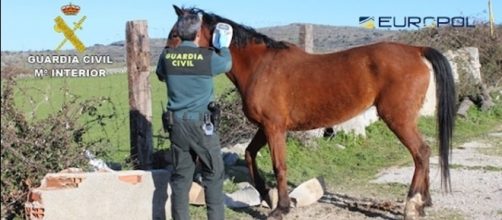Spain’s Civil Guard, in cooperation with Europol, has arrested 66 people for trading horsemeat unfit for human consumption as prime beef. Police estimate the dealer’s profits at around $23 million per year.
International horsemeat ring arrested
In a crackdown on the international ring found to be selling horsemeat across Europe in the guise of expensive beef, 66 suspects are now in custody. Europol reported Sunday that a Dutch citizen is believed to be the head of the horsemeat trading gang and was arrested in Belgium on various charges including crimes against public health and forgery.
Europe-wide police operation busts horsemeat rackethttps://t.co/g7nrqoH7di @BBCNews #crime #Spain #food cc @JoannaBlythman pic.twitter.com/guu2zqrVfy
— 🌎Animal Watch🌍 (@Animal_Watch) July 16, 2017
Europol says a further 65 suspects were arrested in Spain and are facing charges for a series of crimes, including animal abuse, crimes against public health, perverting the course of justice, document forgery, being a part of a criminal organization and money laundering. As reported by The Independent, officials have seized the suspects’ bank accounts, luxury cars and properties as part of the investigation. The gang is accused of taking old or unwell horses and slaughtering them for their meat, then selling it on as prime beef.
Europe-wide investigation into horsemeat scandal
Several EU nations were involved in the food scam operation which reportedly took several months to organize, with Spain, the U.K., France, Belgium, Portugal, Italy, Switzerland and Romania involved.
This isn’t the first time horsemeat has been in the headlines. The scandal was first seen in January 2013, after Irish food inspectors tested ready-made burgers sold by the U.K. Tesco supermarket chain in that country and found them to contain horsemeat. Further investigations showed that meat sold in ready-made meals in many British supermarkets consisted of anything up to 100 percent horsemeat. Investigators found the meat to contain the anti-inflammatory drug phenylbutazone.
Police dismantle crime group trading horsemeat unfit for human consumption. Great effort by @guardiacivil & others: https://t.co/GqSz0yBxQq pic.twitter.com/oDSHBnMTrf
— Europol (@Europol) July 16, 2017
At this time the Dutch meat trader was identified as being involved in the scam, but his whereabouts were unknown. It was during the summer of 2016 that Spanish environmental authorities uncovered irregularities in the sale of horsemeat. The product had been incorrectly labeled and exported.
Old and unwell horses slaughtered
Investigators then uncovered the fact that unwell or old horses were being slaughtered in two different locations in Spain. Europol says the horses came from various places in northern Spain or Portugal and their identification was forged by modifying their documentation and microchips.
The animals were slaughtered and processed, then sent on to Belgium, which is among the largest horsemeat exporters in the EU.
The investigation eventually led the Civil Guard to the Dutch meat trader, who had initially been involved in the beef burger scandal and was based in Calpe, Spain. The suspect had been leading the criminal network from there, with his cohorts located in all the European countries affected by the meat scam.


